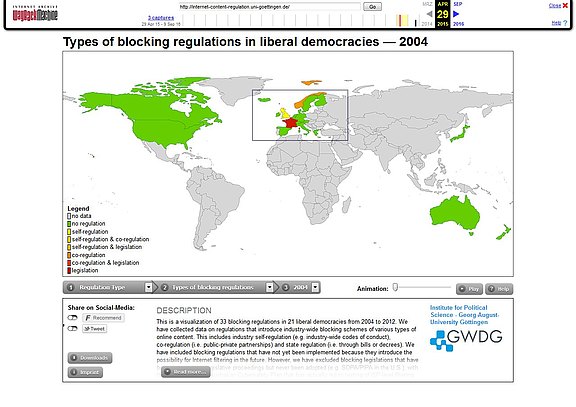Online Content Regulation
A Comparative Analysis of 23 Liberal Democracies
The research project “Internet Content Regulation in Liberal Democracies” is a sub-project of the Digital Humanities Research Collaboration. We adopt a comparative public policy perspective to contrast Internet content policies across twenty-three liberal democracies, focusing in particular on technological means of control. We examine a variety of political variables to explain variations across countries in Internet content regulations and their enforcement.
Researchers
Prof. Andreas Busch, Dr. Yana Breindl, Institute of Political Science
Description
Although the Internet has and continues to be viewed as a ground-breaking medium of global free expression and democratic potential, some types of content are increasingly controversial. This is notably the case of hate or discriminatory speech, depictions of violence or sexually explicit content or massive scale infringement of copyrighted works. With the increasing convergence of previous forms of communication to the Internet and the extension of the online realm to mobile platforms, a variety of actors converge in demanding stronger content regulations, be this by public or private bodies.
From a policy perspective, there is nothing fundamentally new about content regulation. Private actors (e.g. the Church whose "Index Librorum Prohibitorum" was officially abolished in the 1966) or public bodies (e.g. youth protection institutions) have repeatedly attempted to control what type of content reached particular types of users (e.g. children) or restrict particular types of speech (e.g. hate speech in Europe). However, the Internet’s decentralized, global and largely privatized infrastructure challenges existing regulatory arrangements and, in particular, the role of the nation-state in effectively regulating content in the digital realm. As various authors note, Internet content control is one of the drivers of Internet regulation in general. At the international level, reaching a consensus is rather difficult because content policies diverge not only between authoritarian and liberal democracies but also within democracies and across political fractions. It seems evident that the repressive content policies of China, which has built up a highly sophisticated online censorship infrastructure (partly by relying on Western technologies), has no equivalent in the Western world. However, there also exist strong divergences between democracies with long-standing commitments to freedom of expression and human rights. For instance, U.S. courts have repeatedly sacralised the first amendment free speech protection by rejecting any state restriction to online speech, contrary to German or French courts that have applied stronger content enforcement measures on several occasions.
If online content is hard to regulate, digital tools offer nonetheless new forms of automated control. Internet blocking tools, which can take a wide variety of forms, are among the most controversial of these, as they pose a series of democratic questions in particular in terms of transparency, accountability and the rule of law. Furthermore, as states rely on private intermediaries to execute content restrictions online, new forms of private and co-regulatory arrangements have emerged, often in the absence of public debate and knowledge about the introduced measures. Research into Internet blocking has typically focused on authoritarian regimes. However, Western states, with a long-term commitment to freedom of expression, are increasingly debating and implementing Internet filtering. Filtering is becoming a global norm as states and businesses make use of increasingly sophisticated techniques to deal with problematic content.
The research adopts a comparative public policy perspective to contrast Internet blocking policies across twenty-three liberal democracies. We examine a variety of political variables to explain variations across countries in how Internet content is regulated. From July to December 2012, a literature review has been carried out, assessing existing studies and concluding to the need for a comparative and empirical investigation into Internet content regulation in liberal democracies. The report will be available shortly on this page.
There is a clear lack of reliable and longitudinal data about what type of content is blocked or removed by which type of actor, where and through which process specifically in liberal democracies where blocking initiatives are often carried out by private actors and lack any form of democratic scrutiny and public oversight. Furthermore, there has been limited attention paid to the political drivers and factors surrounding the adoption and implementation of blocking techniques. Much of what we know about Internet blocking in liberal democracies is the result of media reports, freedom of expression advocacy or legal studies with little systematic analysis or consideration for political factors. This research therefore fills a gap by providing a comparative and systematic perspective on Internet blocking in liberal democracies in particular. The project has currently entered the data collection phase and is expected to be finalized in March 2015. More information will be posted here as it is available.
Working papers, posters....
- Yana Breindl: Internet content regulation in liberal democracies. A literature review.
(March 2013; DH Forschungsverbund – Working Papers Digital Humanities 2) - Poster (March 2013)
- Interactive website: Types of blocking regulations in liberal democracies (March 2015)
Snapshot: 29.4.2015:
